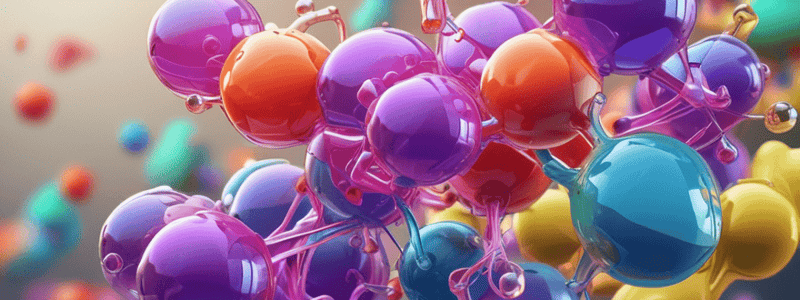Podcast
Questions and Answers
What is the term used to describe the decomposition of a compound by the action of heat alone?
What is the term used to describe the decomposition of a compound by the action of heat alone?
- Pyrolysis (correct)
- Combustion
- Cracking
- Hydrolysis
Which reaction of alkanes is known to be extremely exothermic and requires a very high temperature for initiation?
Which reaction of alkanes is known to be extremely exothermic and requires a very high temperature for initiation?
- Combustion (correct)
- Polymerization
- Cracking
- Hydrolysis
What is the distinguishing feature of the alkene structure?
What is the distinguishing feature of the alkene structure?
- π bond
- Triple bond
- Double bond (correct)
- σ bond
Which process yields predominantly ethylene (C2H4) along with other small molecules?
Which process yields predominantly ethylene (C2H4) along with other small molecules?
What is the general formula for the family of alkenes?
What is the general formula for the family of alkenes?
In which type of cracking are large alkanes converted into smaller alkanes, alkenes, and some hydrogen?
In which type of cracking are large alkanes converted into smaller alkanes, alkenes, and some hydrogen?
Which type of carbon-carbon bond has a shorter distance, according to the text?
Which type of carbon-carbon bond has a shorter distance, according to the text?
Which is NOT one of the three simple alkenes commonly referred to by their common names?
Which is NOT one of the three simple alkenes commonly referred to by their common names?
According to the IUPAC system, what suffix replaces -ane in the names of alkenes?
According to the IUPAC system, what suffix replaces -ane in the names of alkenes?
In naming alkenes, how is the position of the double bond indicated?
In naming alkenes, how is the position of the double bond indicated?
What takes precedence in determining the main carbon chain and numbering direction over alkyl groups and halogens?
What takes precedence in determining the main carbon chain and numbering direction over alkyl groups and halogens?
How do the physical properties of alkenes compare to those of alkanes?
How do the physical properties of alkenes compare to those of alkanes?
What is the reactivity order observed for halogenation?
What is the reactivity order observed for halogenation?
In halogenation, why does an alkane yield a mixture of all possible isomeric products?
In halogenation, why does an alkane yield a mixture of all possible isomeric products?
How do the relative amounts of isomers differ in chlorination and bromination?
How do the relative amounts of isomers differ in chlorination and bromination?
What does the high degree of selectivity in bromination refer to?
What does the high degree of selectivity in bromination refer to?
How does halogenation of alkanes proceed?
How does halogenation of alkanes proceed?
What determines how fast an alkyl halide is formed in halogenation?
What determines how fast an alkyl halide is formed in halogenation?
Which step in the chain propagating process is more difficult than the other?
Which step in the chain propagating process is more difficult than the other?
Why is the chlorination of propane considered an important problem?
Why is the chlorination of propane considered an important problem?
Why is little control possible over the combustion process?
Why is little control possible over the combustion process?
Which type of radicals are formed by abstraction of secondary hydrogens?
Which type of radicals are formed by abstraction of secondary hydrogens?
In the chlorination of alkanes, if isopropyl radicals are formed faster, what product is obtained more quickly?
In the chlorination of alkanes, if isopropyl radicals are formed faster, what product is obtained more quickly?
What sequence is followed in the rate of abstraction of hydrogen atoms during alkane reactions?
What sequence is followed in the rate of abstraction of hydrogen atoms during alkane reactions?
The C─C distance in ethylene is greater than the C─C distance in ethane.
The C─C distance in ethylene is greater than the C─C distance in ethane.
Common names are frequently used for naming alkenes.
Common names are frequently used for naming alkenes.
Alkenes are named based on the rules of the IUPAC system.
Alkenes are named based on the rules of the IUPAC system.
The parent structure for naming alkenes is selected as the shortest continuous chain.
The parent structure for naming alkenes is selected as the shortest continuous chain.
The suffix -ene is added to the alkane name to name alkenes.
The suffix -ene is added to the alkane name to name alkenes.
The position of the double bond in the parent chain is indicated by a letter in naming alkenes.
The position of the double bond in the parent chain is indicated by a letter in naming alkenes.
Alkyl groups and halogens take precedence over carbon-carbon double bonds in naming alkenes.
Alkyl groups and halogens take precedence over carbon-carbon double bonds in naming alkenes.
Physical properties of alkenes differ significantly from those of alkanes.
Physical properties of alkenes differ significantly from those of alkanes.
The IUPAC system is rarely used for naming alkenes.
The IUPAC system is rarely used for naming alkenes.
Alkenes possess unique physical properties that are distinct from alkanes.
Alkenes possess unique physical properties that are distinct from alkanes.
Flashcards are hidden until you start studying




